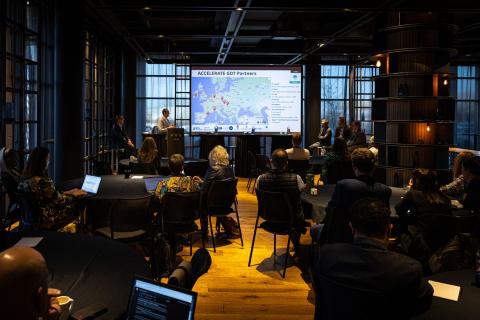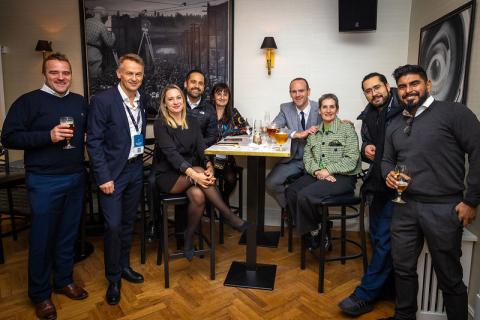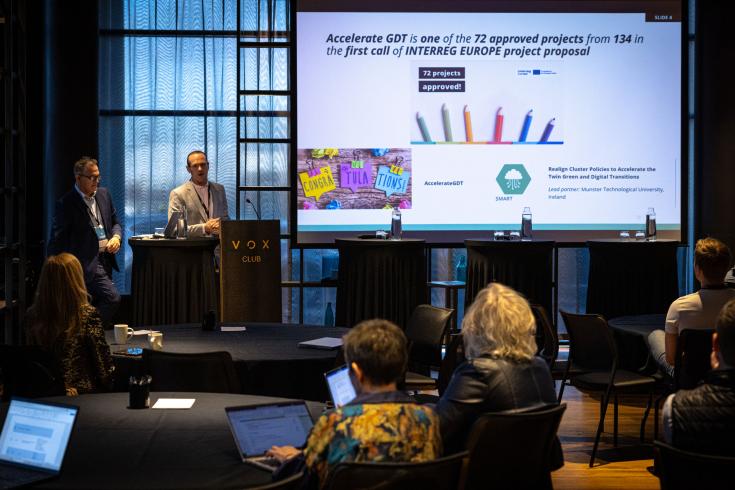Accelerate GDT @ 26th TCI Global Conference
It was a fascinating learning experience for Accelerate GDT as there were local and global examples of mechanisms of economic development in a very different context, with great practical examples of clusters and policies that are using collaboration to sustainably develop opportunities related to Iceland's natural resources and other unique strengths. Accelerate GDT partners were well represented at the conference with delegates from project partners MTU, DBI, ACCIO and the Hungarian Prime Minister Office in attendance.
Dr John Hobbs, Senior Lecturer and Project Manager for the Interreg Europe Accelerate GDT in Munster Technological University participated in a very rich and dynamic session, entitled ‘New approaches to Regenerate’ with Fannar Jónsson, Blue Lagoon, Iceland; Manuel Montoya, CLAUT Nuevo Leon Automotive Cluster, México and Carlos Tarrasón, Cluster Consulting, Perú. The session was moderated by David Fernández Terreros Manager of Clusters Coordination and Research at SPRI, Basque Business Development Agency.
The session was dedicated to understanding the implications for cluster organisations and new cluster policies of fast-changing policy landscapes that are becoming more mission-oriented, purposeful and transformative. With their roots in deep triple-helix collaboration, clusters can be key assets on which to build more transformative policy agendas that require such collaboration to solve complex challenges.
The 3 key learning points highlighted by Dr John Hobbs about the Accelerate GDT learnings for the audience were:
1) Clustering of industry is negatively correlated with key dimensions of green performance and positively correlated with key dimensions of digital performance, due to the concentration of industry in the same geography. However, there is an opportunity for cluster organisations to have a key impact in this space. As they are built on cooperative dynamics, clusters provide solid foundations for supporting transformative policy initiatives.
2) There will not be a “one size fits all” cluster policy framework for the future, for a number of reasons related to structure, culture and political commitment to policy. However, building responsiveness into existing cluster policy frameworks is critical to their impact into the future.
3) The European Expert Group on Clusters highlight the use of clusters as drivers of change, accelerators and enablers of the digital and green transition through mobilising and facilitating cooperation among stakeholders in industrial ecosystems, and embedding supports into local education and training structures. Use clusters to develop and implement digital and circular economy strategies and action plans, detect opportunities for solutions and bring circularity to business processes.

One of the key takeaways for TCI2023 was the clarity that strong cluster organizations are key to powerful clusters. The cluster organization is the 'backbone' of cluster development, as one party must feel the ownership to take this on and take on the connecting role. A cluster is naturally a network of companies and institutions, with diverse interests. A well-organized cluster organization functions as the glue that holds the diverse elements of a cluster together. It provides a platform for collaboration, coordination, and knowledge sharing, which can stimulate innovation, attract investments, and increase competitiveness.
Claudia Soncin, TCI Network, was delighted with the overall success of the 26th TCI Conference in Reykjavik and believes that collaborative projects like Accelerate GDT have a key role to play for clusters, “The policy challenge for National and regional authorities is providing key supports such as investment, training, an integrated ecosystem and opportunities for engagement with policy makers to ensure cluster organisations thrive within a coordinated approach to economic development that is cross cutting across industrial, educational, innovation, societal and environmental policies. TCI and Accelerate GDT are excited to be working and contributing to this key policy space.”


